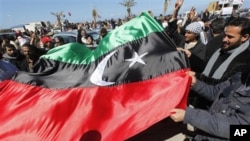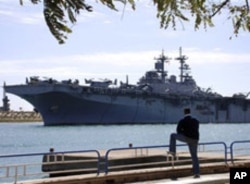As the regime of Moammar Gadhafi continues its crackdown against opposition rebels, the Obama Administration is considering its options. A number of voices in Washington are calling for military action, while others are cautioning against any kind of intervention, worried the U.S. may be on the verge of repeating past mistakes in the Middle East.
Late last week, a group of some four dozen government officials and policy advisors sent a letter to President Barack Obama, asking him to work a little harder to stop the violence in Libya. The letter was organized by the Washington, D.C.-based Foreign Policy Initiative (FPI), a neo-conservative think tank whose members include several former advisors to President George W. Bush - among them, former Deputy Defense Secretary Paul Wolfowitz.
The letter called for several steps to be taken in response to the violence against Libyan civilians, including steps which have since been resolved by the United Nations, such as freezing Libyan government assets and issuing a stern warning to Gadhafi that he will be held accountable for “the slaughter” in Libya.
In addition, the letter urged the United States and its NATO to take other more aggressive action, cautioning that a failure to act would cast doubt on the U.S. stated foreign policy goals of promoting human rights and freedom.
"No-fly" zone versus military overthrow
Jamie Fly, executive director of the FPI, was among the signatories of the letter. “Specifically we wanted them to seriously consider a no-fly zone or some sort of effort to ensure that Libyan airplanes could not attack civilians,” he said. “We also wanted them to urgently get humanitarian aid into the country and to work with our NATO allies and other partners to make clear that any crimes against civilians would be eventually handled under international law.”
Fly is careful to stress that the letter’s authors are not advocating a military overthrow of Gadhafi or any sort of full-scale invasion or occupation. “We’re not talking other than perhaps limited interventions like those the British and Germans carried out over the weekend to rescue their citizens that were stranded at various remote camps,” he said, adding, “we may need some ground forces to do those sorts of surgical actions against key targets.”
Motive of military intervention questioned
But other analyst bristle at the mention of any kind of military intervention - among them, Adil Shamoo, an Iraqi-born senior analyst for Foreign Policy in Focus, a project of the Washington, D.C.-based Institute for Policy Studies. The group, which calls itself a “think tank without walls,” is an amalgamation of hundreds of writers, scholars and activists for social change. Shamoo expressed strong skepticism about U.S. motives in Libya, saying that the U.S. would never intervene for solely altruistic purposes - but rather, as part of a specific political agenda.
“It was just a decade or two ago,” he said, “when Tony Blair, representing the Western powers, went to Libya and gave a hug and a kiss to Moammar Gadhafi, and they received many, many oil contracts as a result of that. We will not put our boys and girls in harm’s way for nothing.”
Painful memories of Iraq invasion
Shamoo says one doesn’t have to look far back into history to see the dangers of military intervention. He says he speaks for many Arabs who still carry painful memories of the U.S. invasion of Iraq in 2003 and its aftermath. “That invasion - everybody in this country was championing it, was calling for it, and look what happened. Several hundred thousand Iraqis got killed, half a million wounded, 70,000 orphans, the whole infrastructure of Iraq has been destroyed. The current government is corrupt - and for what?”
Shadi Hamid, Director of Research at the Brookings Institute’s Doha Center and a Fellow in its Saban Center for Middle East Policy, says comparing Iraq to Libya is like comparing apples and oranges. “This is not an Iraq situation,” he said. “This is a situation where a regime is killing its own citizens in broad daylight. It has said unequivocally on television that it wants to kill its own citizens. So this is unprecedented. It’s very rare to hear a leader declare his intentions in such a manner, and I think we should take it seriously.”
"Caution" factor
Hamid said he worries that the U.S. might be so haunted by the mistakes it made in Iraq that it would fail to take action in what is a truly humanitarian crisis in Libya. “Unfortunately, we have a president in the U.S.,” he said, “and I think this goes for many Western leaders, who are defined by their caution. They are afraid of making the wrong moves, so they don’t make any moves at all. And when they do, it’s quite late in the game.”
That is not to say that imposing a no-fly zone in Libya would be risk-free for the U.S. and NATO allies. “It could cause problems,” Hamid said. “It could provoke a response that we’re not expecting. But we have to choose between policy alternatives, none of which are ideal, and you try to weigh the costs.”
Some officials say the entire debate may be mute. NATO has said that any intervention would have to be sanctioned by the U.N. China and Russia, both of whom hold permanent seats on the Security Council and enjoy veto power, indicated this week that they would prefer to see the matter resolved diplomatically.













